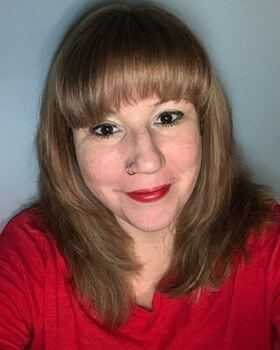What do you get when you put together a very dramatic tortellini lover and a first-year clinical mental health counselor? An impasta.
My name is Jennifer Anderson, I love noodles, and sometimes I convince myself that I am not a real therapist. I frequently find myself juxtaposed within my internal system. Some days, I feel like the equivalent of a kid sitting on another kid’s shoulders trying to get into an R-rated movie. Other days, I feel like I am the producer, director, and star of the movie.
In 2011, I earned a degree in the secondary education field. I was certified to teach English and Speech. During the infancy of my teaching education, I spent hours watching my first mentor teacher validate and honor her students’ successes and failures. She taught me to notice the “light bulbs” popping above a student’s head as they tapped into their creativity. Her modeling and passion were inspiring. My takeaway from her mentorship had little to do with teaching kids how to write five-paragraph essays and everything to do with the students’ personal growth and learning.
I quickly learned that many of the students did not have a support system outside of school. I spent days ruminating about what these kids might be going through at home. I stretched myself thin with work and my efforts to maintain a safe environment for my students.
I wanted to direct plays, volunteer for all the school activities, chaperone, open my lunchroom to any kid who needed unconditional positive regard. I was a Rogerian in the making and I didn’t even know it. There was just one small problem. I did not like teaching. I spent half my life thinking I was going to be a teacher and until I started the counseling program at Oakland University, I was ashamed to admit to myself that I almost immediately wanted to leave the profession before I even secured a permanent teaching position. I did one interview. I didn’t get the job.
I was in therapy, trying to figure out what to do with myself. I had been treading water, trying to cope with the aftermath of having a premature baby. I was now a mother of two beautiful and mostly healthy boys, one of whom was on oxygen during the first 8 months of his life. As the little one grew and recovered and I became more emotionally regulated, it was time to choose a path. After exploring the parallel between everything I loved and missed about teaching, my therapist, Ted, mentioned that I might be a good fit for the mental health field. Ted was correct. I cannot imagine a better fit for me. I am very thankful for Ted.
In 2019, I shuffled into orientation, sat in the chair admiring my new Oakland University Department of Counseling t-shirt, and I exhaled a breath I hadn’t realized I had been holding in for almost ten years. For the first time, I felt truly authentic and at home in my skin. I ended up using the best parts of my teaching experience to forge an unexpected path into a different shade of the helping profession.
I laughed out loud when I learned how much a counselor can make in one hour. “I don’t know if I’m worth THAT much.” Yup, I said that during a phone interview, and still, I was met with a gentle and reassuring, “Yes, you are.” Ha! Suckers. Surely, my clients will take one look at me and realize I’m a fraud. Turns out, it isn’t easy to be a fraud in the field of counseling. Especially when we’re trained to notice the unauthentic and disingenuous tendencies of humans. I had no choice but to sit in that discomfort and get over myself. Imposter syndrome or not, I earned the degree, and I am most definitely a counselor. I know I am not the only one who periodically forgets my own value because I am too busy helping other people learn to thrive and love themselves.
The first time a client shared positive feedback with me, I looked around the room for hidden cameras. Ashton Kutcher was about to open the door and yell, “Prank! You’re the worst and the client hates everything about you and you should probably quit now.” Edward, a 45-year-old artist who experiences frequent anxiety and depression, started seeing me during my practicum. He stayed with me through my internship and continued seeing me for several months after I became an LLPC. About six or seven months into our working relationship, he decided to perform for me the original guitar piece he had been working on for several years. We somehow started talking about how reading music works for guitars. I was doing my best to understand the complexities of his craft when he used the word “tablature.” I blurted out something random, “that word made me think of the word ‘overture’. Sometimes I can’t stop my mouth from verbally narrating my inner monologue. I felt awkward after I said something completely unrelated. His response, “I think you just named the piece.” The session continued uneventfully, and it wasn’t until recently that Edward shared with me that one of the most transformational moments in his life was the session in which I accidentally named his guitar piece. I hadn’t given it a second thought, but he found comfort and closure by naming that song.
During my practicum, I showed a recorded session with a 30-year-old man, Jacob, who presented with anxiety about fertility concerns. He and his partner had been trying to conceive for two years. During one of our sessions, we were talking about parental instinct and the paradigm shift that might come with trying to keep a tiny human alive in a world where everything wants to kill you. I was terrified of saying something insensitive to a person who is exploring the possibility of infertility. Instead of saying something empathic, I said something ridiculous. I gave an example of what that instinct may look like.
Actors Ryan Reynolds and Blake Lively are parents together, and shortly after his first child was born, Ryan was on a late-night show describing the dynamic of his family. He shared that before he had his child, he would tell Blake that he would protect her with his life. He then went on to say that once he looked into his new baby’s eyes, he knew at that moment that he would not hesitate and immediately “use Blake as a human shield to protect that baby.” My client laughed and for two seconds, I laughed with him until I realized that I had just made light of being a parent in front of someone who desperately wanted to be a father.
With my tail between my legs, I shamefully and dutifully sent the recording to my supervisor. I was going to be eviscerated and booted from the program. When it was my turn to present a case, I spent twenty long minutes trying to appear neutral and confident while my mistakes played out for everyone to see. Once the clip was over, I braced for impact and of course, she decided to dissect the one part of the session that I was desperately hoping she would not notice. Doomed.
She told me that the only truly genuine moment in the session was when I cited the tweet about parenting. I couldn’t believe it. I was originally offended. I was not being too serious! Fertility is serious! I can’t be myself when this man is suffering. The professor explained that well-placed humor can balance tough content when it serves the client. We were advised to avoid using humor to quell our own discomfort which is harder than one might think because I absolutely have a history of using excellent jokes to mask darker feelings.
In retrospect, these first few instances of validation and feedback have informed my practice more than anything else. A few Yalom books later, I’m relatively confident that through honesty and a little bit of hilarity, I do my best work. The next session I had with Jacob was bittersweet because my semester was ending. As we said our goodbyes, my client shared that he and his partner were pregnant. I’m not crying. You are. We both offered wishes of health and happiness to one another, and just like that, I was a counselor.
I am currently only offering telehealth because of well, you know, *gestures at everything.* I don’t have a physical lobby with relaxing music pumping through hidden speakers that are neatly tucked behind a Ficus in the corner. There is no coffee table laden with outdated People magazines. Still, I have several stellar clients who offer me their vulnerability, each week, again and again. Each time I hear the *ding* to alert me that a client has arrived at my virtual waiting room, I further trust myself, and slowly I settle into my role as a helper. I feel less like an imposter after each session. I don’t need to disguise myself by paying my cousin $50 bucks to sneak me into the counseling field by carrying me on his shoulders. The only person who sees an imposter is me. I am working on getting over myself. I will continue to enjoy noodles but I don’t think I will feel like a fraud very often anymore. I am Jennifer Anderson, I love noodles, and I am most definitely a therapist, and dare I say a good one? The next time I question myself as a counselor, I will remember that in addition to my experience and training, my growing competence is reflected by my student loan balance.


